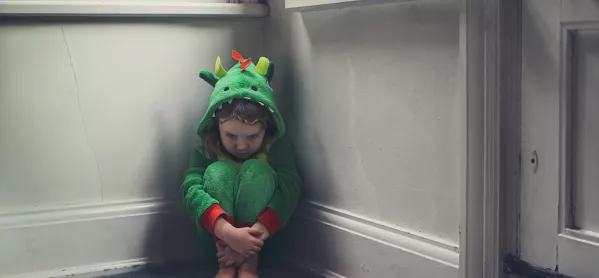- Home
- EYFS: Why ‘you’re okay’ is the worst thing to say to an upset child
EYFS: Why ‘you’re okay’ is the worst thing to say to an upset child

Young children have yet to develop adult hang-ups about hiding emotion, so working in early years foundation stage, you get to witness every feeling a child has in its rawest form.
In response, and particularly when those feelings are sadness or pain, there tends to be a consistent and singular phrase that comes from nearly all adult mouths.
It is a phrase we probably heard as children ourselves. It is a phrase I would love to create some real doubt in your mind about.
That phrase is “You’re okay!”
Quick read: Stop being a slave to the teaching schedule in EYFS
Quick listen: Why child-led learning does not work, according to professor David Geary
Want to know more? Learning through play: Professor David Whitebread on the benefits
Telling an upset child “you’re okay” is, at best, well-meaning but completely useless. At worst, it is simply gaslighting them and doing nothing at all for their social or emotional development.
Early years approaches
When we tell upset young children “you’re okay”, what exactly are we teaching them about their own emotions?
Simply put, “you’re okay” adds nothing of value to a given situation, nor does it develop our relationships with them.
Am I exaggerating? Next time your spouse, partner or friend is upset over something, try telling them “you’re okay” in a reassuring tone and feel free to let me know what they think of you.
Misguided support
Obviously, there are plenty of good intentions behind “you’re okay.” We want to protect young children from experiencing the rougher feelings of life.
But the truth is, they are feeling them regardless, and “you’re okay” does nothing to help them understand and cope with their emotions, nor does it suggest you understand them.
There is an unspoken but widely held idea that a good early years practitioner keeps children happy and perfectly entertained all day long. This is romantic nonsense.
Children don’t need birthday-party entertainers, they need educators who understand self-regulation, co-regulation, attachment theory and much more. They also need educators who have the emotional reserves required for this genuinely hard work.
Emotional rescue
Yes, young children often get upset over completely childish, and in the grand scheme of it all, quite insignificant things. This does not make their feelings any less real.
And those feelings are also completely legitimate.
This seems to be a hard pill for many, if not most, adults to swallow so please let me correct a very common misinterpretation of this idea: respecting young children’s emotions as legitimate does not mean doing everything we can or giving them everything they want to keep them happy all day; nor does it mean we never set limits on their behaviour.
What am I proposing then?
Think about the times in your adult life when you have been upset.
Which responses from your loved ones meant the most to you? Did they try to instantly solve your problems? Did they try to jolly you out of your tears by tickling you or distracting you? Did they tell you to stop crying?
Or did they simply just listen to you and acknowledge what you were feeling in the moment?
Legitimate feelings
Young children are really no different, except that they don’t yet have the vocabulary or life experience to help them begin to make sense of what they are feeling. Helping them label, understand and get through the other side of tough emotions is the foundation of supporting their personal, social and emotional development.
For example:
-
“You seem really sad that Mum had to leave. I can stay with you and look after you until she comes back.”
-
“I’m not going to let you hit him. I can see you are angry, but I need to keep everyone safe.”
-
“I hear you, you don’t want to go inside, but it is almost home time and I have to bring you in now.”
To be clear, acknowledging feelings is not a golden bullet for getting children to happily comply with all of our instructions or to stop “fussing” quicker. It is, however, a valuable way to build deeper and more secure relationships with the children in your setting.
Hard to get right
I can write all this quite easily, but please let me be clear: I do not get this right all of the time. We all have our limits. We need to be honest about them.
I get impatient and cross with children more than I would like to admit. What I have learned to do now is apologise or, at the very least, make an effort to show that I still value my relationship with them after the fact.
All relationships have ups and downs, and again, ours with the children in our settings are no different. They absolutely don’t need us to be perfect. Though they do need us to be honest, caring and reflective.
David Cahn is the author of Umar, a children’s book about a young boy fascinated with keys and determined to learn how to use them
Keep reading for just £1 per month
You've reached your limit of free articles this month. Subscribe for £1 per month for three months and get:
- Unlimited access to all Tes magazine content
- Exclusive subscriber-only stories
- Award-winning email newsletters



